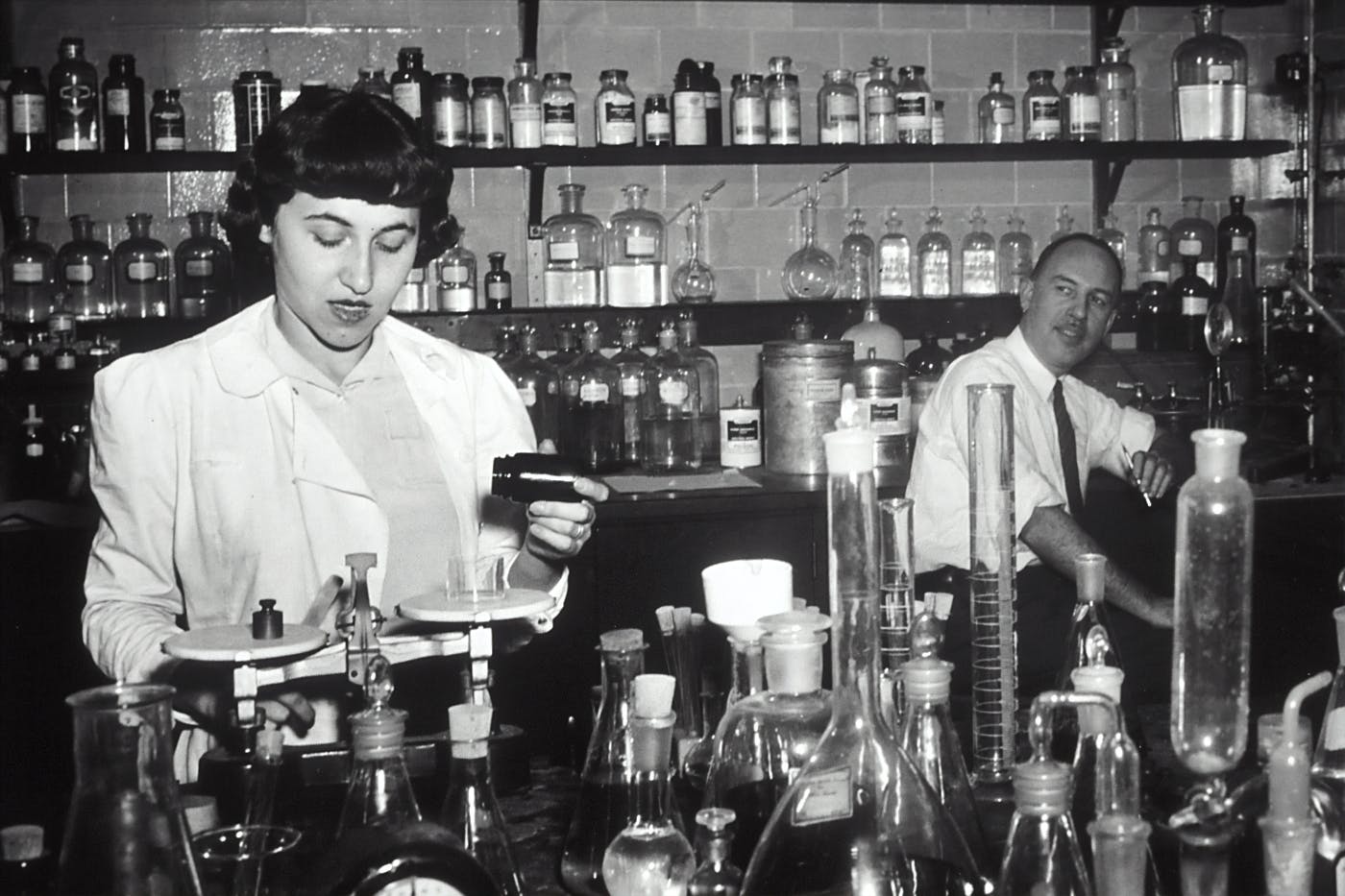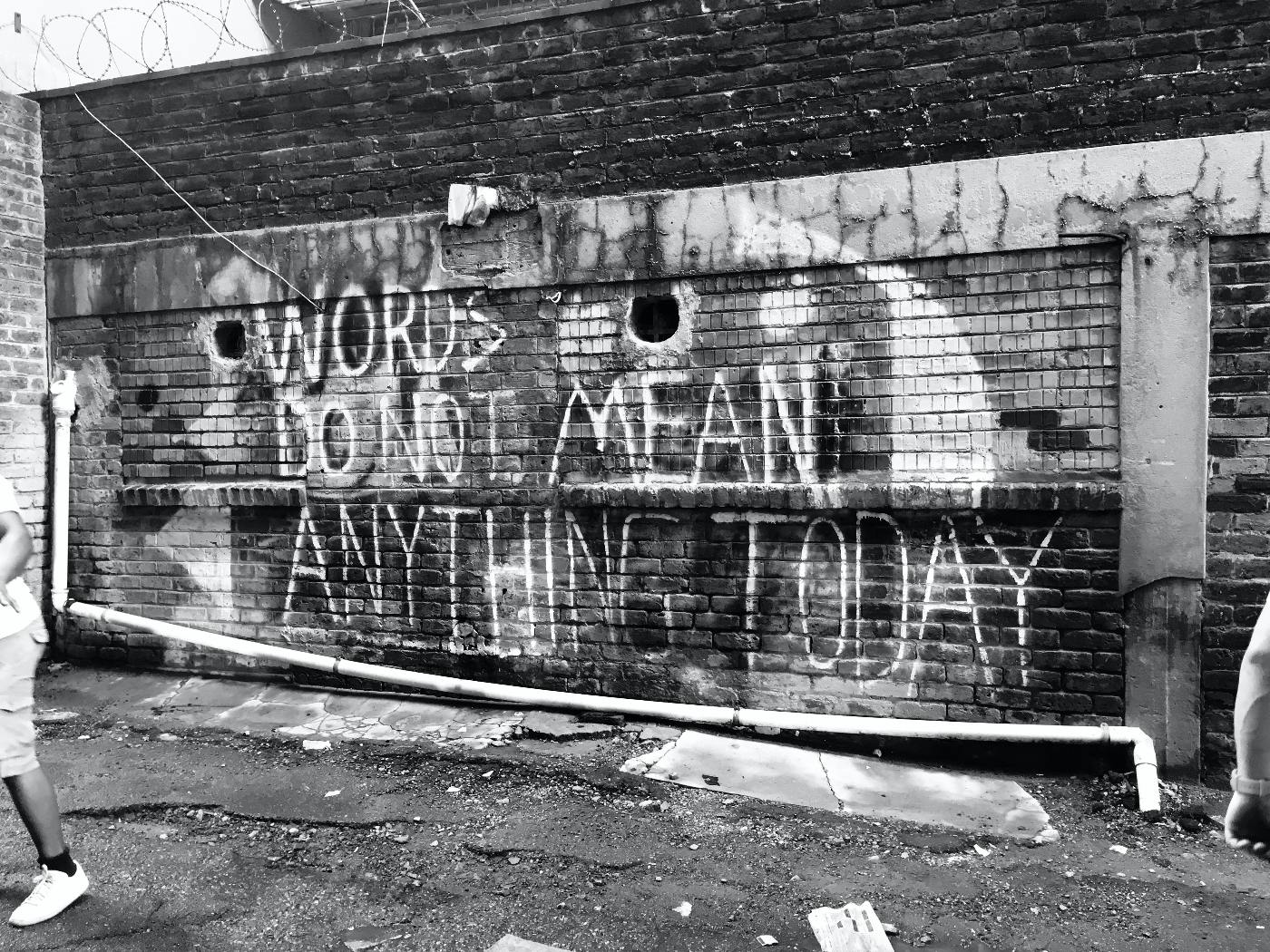
Without words, brands have difficulty expressing and showcasing what they do. If they can’t do that, they can’t make money. If they can’t make money, they can no longer exist. Words, therefore, are life and death in business.
There are stories in every occupation about getting ahead, how to get ahead, and what you don’t need to know. Most of them are myths or fabrications. Those on the inside usually perpetrate them to make their jobs or life seem more difficult or magical.
It’s like the myth of actors. Some actors genuinely believe that if you do extra work on a film or a TV show, you will get “discovered.” Sorry to crush any actor's dreams, but that’s not true. On set, if you’re an extra, the director doesn’t even know you exist. And, if the director does know, it’s probably because you stuck out doing something stupid, like looking directly into the camera, and you’re going to be yelled at for ruining the shot.
The days of sitting at the lunch counter in Shwabs and being discovered are gone if they ever existed. Times change, and what may have worked once in an occupation doesn’t necessarily mean it is still the norm or will work.
What Do You Know About Copywriting
You'd think the written word was done for in a world of visual stimulus, about a billion and a half streaming services, and phone apps that allow only one comment per post. Simply put, that’s not true.
Words are still vital in business. Words are ammo; words are direction; words are the story that makes the consumer stop, think, and buy. No matter how big the business is, it still needs words to help it survive.
Well-crafted sentences, well-chosen words convince, and above all, they convert. They turn that casual browser into a customer for life. The right words can engage, entertain, motivate and persuade.
Without words, brands have difficulty expressing and showcasing what they do. If they can’t do that, they can’t make money. If they can’t make money, they can no longer exist. Words, therefore, are life and death in business.
So, copywriting is vital, make or break, and takes a certain amount of skill. The word talent is bandied about, but that word is so subjective. Ask anyone who has had to sit in a crowded living room while cousin Ralphie sings “Jellicle Songs for Jellicle Cats” and then watch in horror as people fawn over the kid and whisper how “talented” he is. Talent is subjective; skill is palpable.
There are a lot of myths and ideas, best practices, and hard-won advice in the copywriting world; here, we will bust some myths, slap down some truths, and hopefully give you a better appreciation of what your copywriters bring to the table.
You Don’t Need Any Writing Experience to be a Copywriter
I have heard this and read this in ads promoting a great job with no demands, and you can make $100,000 a week. They claim you can be a copywriter and need no writing experience.
That’s just not true.
While it may be true that you don’t need an advanced degree in English to be a copywriter, and with all the writing apps on the market today, you barely need more than a cursory knowledge of grammar and spelling. But that’s ignoring a serious fact.
If you have no writing experience, you’ll have trouble sitting down and writing. You must produce all the time and then edit and rewrite it. You must write in many voices and styles. You must write tight captions for social media and 5000-word blogs about tech products. You have to have the discipline to sit down, day in and day out, hour upon hour, and write.
Suppose you haven’t written anything of length since college term papers. In that case, you need to get more writing experience, if only for the stamina and the practice of writing daily, before you jump into a copywriting job.
Technically, you don’t need any experience to run; however, if you’ve lived on Cheetos and frozen pizza, then on the morning of the New York City Marathon, you think I’m gonna run that today, you will fail and possibly die.
Beyond words, you need experience in the discipline of writing. You need experience writing different voices and styles, handling writer’s block, and what to do when you’re creatively dry. So, yes, you need writing experience to be a copywriter.
You Need a Little Knowledge of Psychology

You’re asking a stranger to take out their credit card and give you money. One person asking another person to part with their hard-earned cash. They will want to know why.
Why is a big question. If you’ve ever engaged in therapy or seen a therapy session played out in a movie or on TV, you know that therapists like to ask Why. Why did that bother you? Why do you feel that way? Why did you call her? So, it makes sense that a potential customer would ask, why should I give you my money?
Having some familiarity with psychology and how people think and act will be helpful as a copywriter. You will be better equipped to handle why you’ll also understand the principles of wants. What do you want, why do you want it, and how are you going to get it?
Those three questions, and answering them for the potential customer, are where some psychology comes in handy.
You don’t need a Ph.D., nor do you have to be Sigmund Freud, but if you’re a little Jung at heart, you will have an advantage, especially when you start delivering into archetypes.
Storytelling Skills are a Must
There is more involved in converting than just writing; you need this, so buy this. You need to be subtle, you need to listen, and you need to tell a good story.
Say Bob is a potential buyer. Bob has come to your website three days in a row and looked at this jacket. Perhaps this jacket is slightly outside Bob’s price range; what do you do?
A good copywriter will employ some basic psychology and write a great story where Bob and the jacket are the story's stars. Now, you cannot write directly to Bob because all the non-Bobs out there will not be interested. So, a copywriter writes a story where anyone can be Bob, and they are the central character in the story about them and this jacket.
It’s the same psychology behind the trend of headless mannequins. Without a head, the customer can better picture themselves in the article of clothing. A copywriter knows how to write a “headless” story. A compelling story that is just vague enough but still specific enough that the customer sees himself in it. At the center of it.
With good storytelling, no matter who looks at the jacket, they read the copy and feel that the story you’ve crafted is about them. It’s all about listening, telling great stories, and being able to communicate across the miles and various mediums to make the customer feel singular and special.
If you’ve never told a story in your life, you will have some difficulty being a copywriter. You can learn this, but it takes time and practice.
You Cannot Shy Away From Emotions
The image of the cold, unfeeling businessman, ruthless, cutthroat is pervasive in movies and lore. That’s fine for the big wigs in the c suites. Still, as a copywriter, you’ve got to depend on emotion, emotional responses, and quite frankly, not be afraid of a little emotional manipulation.
This gets a little tricky. All people crave being seen as an individual. They are unique and singular, and general emotional traps cannot manipulate them. So, you want to make your copy as individual as possible.
However, it is also true that all humans, in the collective, respond similarly to a particular set of feelings. Those feelings include:
- Anger
- Happiness
- Awe
- Inspiration
- Confusion
- Jealousy
- Familiarity
- Trust
- Fear
- Motivation
- Aspiration
- Danger
So, while you’re writing your specific to Bob copy, you’re also looking to encompass the range of emotions that are part of the collective conscious. That’s where being Jung at heart comes in.
Babies and puppies make people ooooh and aaaahhhhh. Images of Grandpa walking with his toddler grandson make us question our mortality and long for better days. Pictures of pretty girls in convertibles make us aspire to that kind of life. No matter how much people claim I am me, I am unique; we all respond to certain feelings.
So, when you’re a copywriter, you must recognize and access those emotions in your writing. You can’t write something for people to feel if you're not allowing yourself those feelings.
Tapping into these universal human feelings gets people to act, which means clicking on the CTAs, buying products, or telling others about your brand.
An emotional response is active, lands deeper, and hangs on longer than other approaches.
Research is Key

Remember when you had to write research papers in high school and college? Those times you thought if only I could type a subject into a machine and get all the information I need. And then google appeared, and we stopped doing research.
As a copywriter, before starting a project, it is wise to research the subject. And, when we say research, we mean more than just a quick google search to get the vernacular down.
The more you know about the subject you’re writing, the better off you are in the long run. If you can stay with the client in a meeting when they are talking about their business, if you know some of the minutiae that goes into the subject, it will be easier to write about. And the more of an expert you’ll sound.
Ease of writing is increased exponentially when you know as much as possible about the subject. Go down rabbit holes when you're writing. Find out more than just the basic facts. It’s like the great actor Denzel Washington said when playing Hurricane Carter. He trained for a long time as a boxer before filming because, as he said, I don’t have to think about what it’s like to be a boxer, I am a boxer, so I know what it’s like. The more and deeper research you do, the more information and better insider view of the subject you’ll have. You don’t have to think about it; you just write from a place of knowledge.
As the master of copywriting, David Ogilvy, once said: “there’s something interesting to say about everything if you dig deep enough.”
Your Copy is Open to Interpretation, So Let Someone Else Read it Aloud
You’re alone and working out of your own head when you write. This means you have a definite idea of what words are emphasized, the cadence of the writing, and the flow. All that is great; however, the people reading your copy are not in your head and don't know the rules, so they will read it as they read anything. In their own cadence, with their own emphasis.
One of your jobs as a copywriter is to write in such a way as to give direction to the reader, so they know how the copy is meant to be read. Using active verbs, removing too many adjectives, and having a strong, confident voice are just some ways you can subtly direct the reader.
Also, when presenting the copy, have someone else read it; you’ll know immediately if you’ve given enough clues about how the copy will sound. If in the middle of someone reading your copy, you suddenly shout, no, you’re not reading that correctly; who’s fault is that?
Yours.
ThoughtLab Has Master Copywriters
So, there you have it, some truths, some hints, some direction for all the would-be copywriters out there.
If you employ copywriters, you know they are creatives and need to be handled differently than accountants, factory workers, or HR people. Knowing how to handle your creatives can help them remain happy, productive, and in your employ.
If you want to be a copywriter, you DO need writing experience. You DO need to read great copy, and you can go wrong reading Ogilvy’s book. You Do need to know how to research, how to use emotions, and how to write in many voices and styles.
If you don’t have copywriters, but you need them, or your current writers just aren’t cutting it, give us a call here at ThoughtLab; we have gifted storytellers with years of experience and drive to elevate your brand and get you seeing further and reaching more people than you ever imagined.
Remember, the words can make or break, don’t trust them to just anyone.

